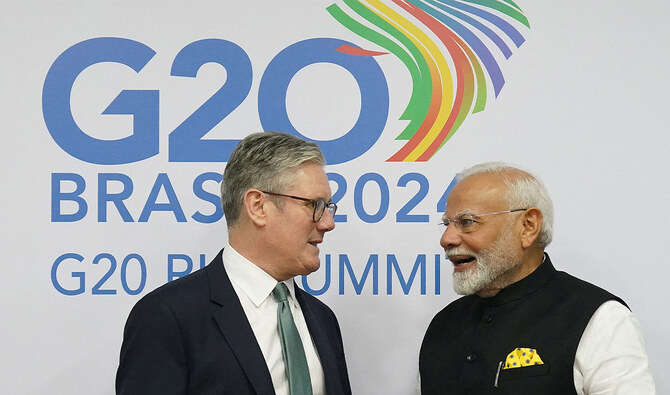NEW DELHI: India and the UK are set to resume talks on a free trade deal, Prime Minister Narendra Modi’s office said on Tuesday, following his meeting with British PM Keir Starmer on the sidelines of the G20 Summit in Brazil.
The two countries first started discussing a free trade agreement in 2022, with the aim of doubling bilateral trade by 2030 from over $31 billion then.
The FTA discussions have stalled since, though total trade between India and Britain — currently the world’s fifth- and sixth-largest economies — was worth $42 billion in the 12 months to June this year.
Modi and Starmer met for the first time in Rio de Janeiro, where they agreed to strengthen cooperation and restart the talks.
“Both leaders underlined the importance of resuming the Free Trade Agreement negotiations at an early date and expressed confidence in the ability of the negotiating teams to address the remaining issues to mutual satisfaction,” Modi’s office said in a statement.
“The two leaders directed their ministers and senior officials to work toward faster implementation of the various understandings that form part of the India-UK Comprehensive Strategic Partnership.”
Free trade negotiations will restart early next year, according to a statement issued by Starmer’s office, with the UK seeking a “new strategic partnership” that covers deeper cooperation in security, education, technology and climate change.
Their strategic partnership was an “immense priority” for India, Modi wrote on X.
“In the coming years, we are eager to work closely in areas such as technology, green energy, security, innovation and technology. We also want to add strength to trade as well as cultural linkages,” he said.
The talks have been delayed for a number of reasons, including political turmoil in the UK and elections in both countries, said Shairee Malhotra, deputy director of the strategic studies program at the Observer Research Foundation in New Delhi.
“With a more stable government in the UK now and the deal holding bipartisan support, the time is ripe to resume negotiations,” Malhotra told Arab News.
But there are “contentious issues” that they need to resolve, including India wanting a more liberalized visa regime for its professionals and students and the country’s steep import duty on British whiskey.
“These demands on both sides need ironing out in order for the FTA to be concluded. But there is an immense amount of political will on both sides and India too has recently adopted a more open and forward-looking approach to trade deals,” Malhotra said.
There is also a strong geopolitical aspect attached to the deal now, with both Britain and India seeking to diversify their trade and supply chains to reduce dependencies on China and the victory of Donald Trump in the recent US presidential election likely factoring in during negotiations.
“In the context of a second Trump presidency and his penchant for tariffs, the FTA, with its potential to increase trade, investment and jobs, may assume greater significance,” Malhotra said.

























